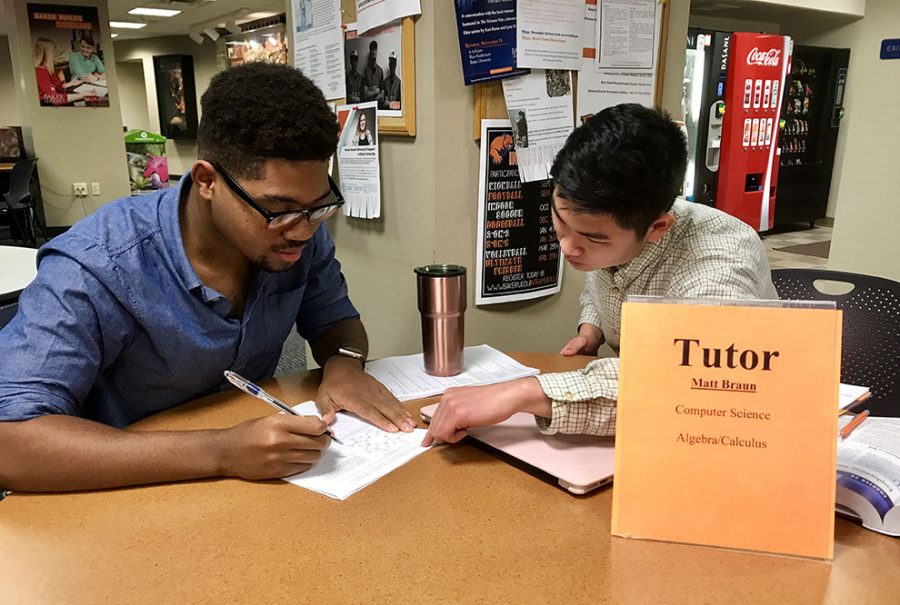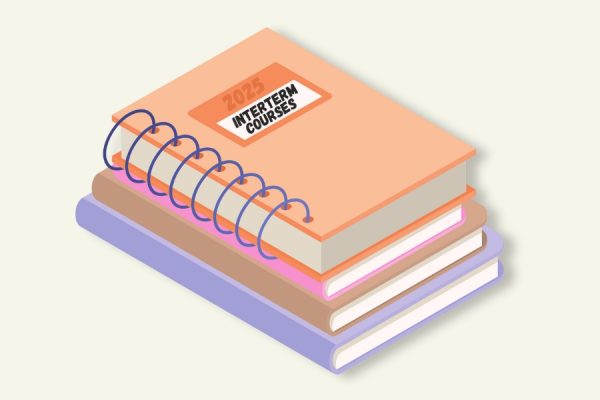Inside the minds of Baker tutors
Junior Matt Braun assists freshman Johnny Lee with homework Nov. 27. Braun is a tutor in Computer Science, Algebra and Calculus.
Student Academic Success (SAS) offers a range of educational services for students. One of the many opportunities SAS provides for Baker University is tutoring. Tutoring is offered for several classes including: accounting, quantitative analysis for business, chemistry, international studies, statistics, public relations writing and more. There are seniors, juniors and sophomores in the tutoring program, as the program doesn’t allow freshmen tutors. Students rely on tutors to help them understand what couldn’t be understood in the classroom. I spoke with a few students who shared their experiences as tutors.
Senior Mackenzie Brock tutors for accounting, algebra, business, corporate finance, economics and managerial accounting courses. She is an accounting and business finance major from Dodge City.
As a tutor what challenges do you face?
Finding the right way of explaining things to people because people learn differently and at different rates. Finding a specific way that helps them learn even if it may not be the way I learned it.
During you experience as a tutor, what have you learned about yourself?
I learned that I have to be patient. Patience isn’t just important for this job but it’s important for my future. When I graduate and get a job I’m going to have to work with other people.
How did you get involved with tutoring?
Myron Tipton got me involved. He was my tutor, he was kind of my mentor that I had freshman and sophomore year. He helped me get good grades in accounting. Paulette [Schwerdt] noticed how well I was doing, and Myron suggested that I take his place as a tutor when he graduated. So, that’s how I became Paulette’s PSI (Peer Student Instructor) and then the tutor for SAS.
If someone were considering becoming a tutor, what key attributes do you think they would need to be successful?
Good communication and adaptability. You have to have good communication because you want to establish the trust between the tutor and the student. Once you do that, then they feel comfortable continuing coming back to you and there’s better a chance their grades will improve and what you’re doing is having an impact on their education in a positive way.
What, if anything, would you improve in the tutoring department at Baker?
We should add more tutoring time to the afternoon and add more people to the tutoring program instead of having students tutor three to five subjects apiece. That would probably help SAS in terms of getting more traffic into the tutors. More students might be interested in applying because right now some people can’t apply due to their schedules, but there’s a lot of people qualified for the job.
Matt Braun is junior and tutors for calculus I, II and III courses. He also tutors for computer science and trigonometry courses. He is a computer science and mathematics major from Colorado.
What do you enjoy most about being a tutor?
Having the opportunity to help other people understand, learn and spread knowledge. If we’re all more knowledgeable, it makes the world a better place.
What have you learned about other students?
A lot of students learn differently than others, which mean that you have to approach tutoring in different ways.
Over time what have you learned about yourself from tutoring?
It taught me to be really patient and it also helped with problem solving because sometimes I’ll be brought something that I’ve never seen before and I have to problem solve quickly with the tools that I’ve learned and been given in my classes.
What advice would you give to people who are considering becoming a tutor?
Be selfless. Put the student before yourself and try to understand where they’re coming from and the best way for them to learn the material and prepare for the test. Be willing to do the most you can. Sometimes you won’t have all of the answers, so sometimes you have to be honest and say that you just don’t know. That part is kind of hard.
What are some of your tutoring techniques?
Asking thought-provoking questions that will get them thinking in the right direction. Ultimately they’ll end up answering their own questions instead of just giving the answer to them.
Also, reviewing any class work, going through notes, sections or chapters that they didn’t fully understand.
Fabien Franck Love is a sophomore who offers his algebra skills to Baker students. He is from Los Angeles and majors in computer science.
What advice would you give someone who may want to tutor at Baker in the future?
Always be on time. There are times when people are expecting you to tutor them during your hours, so showing up on time is important.
What is you most interesting experience so far as a tutor?
When I log in for tutoring I always leave lyrics to songs for Samantha just to make the workplace fun.
What are some of your tutoring techniques?
I leave hints so that the student can piece the objectives together, which would speed them up to pace with the lesson and evolve their critical thinking skills.
What can students do to make their tutoring experience easier and more beneficial?
I expect students to have some general idea of what they’re doing. I can’t babysit students who haven’t taken the time to study for themselves.







